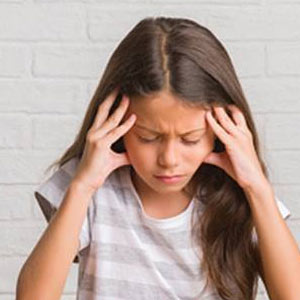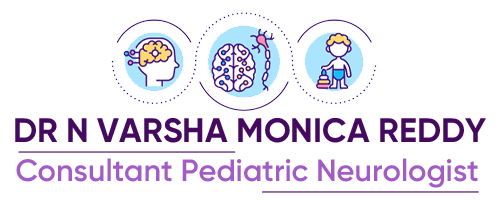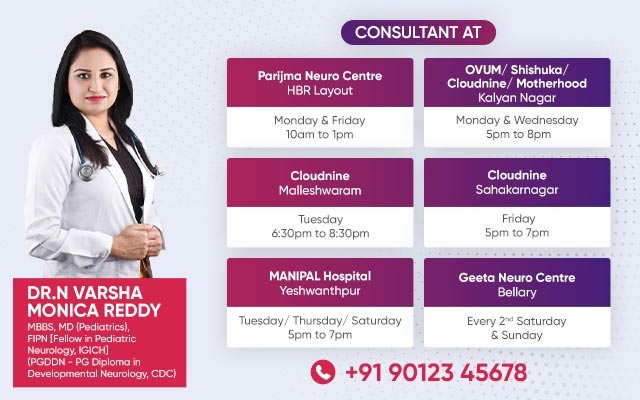Headache are common in children, yet generally are not harmful and don't disturb their lives. However, in specific children, headaches become extreme or recurrent. On rare occasion, they may be the indication of a underlying disease. Dr. Varsha Monica Reddy is the children headache specialist in Yeshwanthpur who gives accurate diagnosis and manage headache. Dr. Varsha and her team believes in giving comprehensive, compassionate care for children of all ages.
What are the two categories of headaches?
Children can have 2 categories of headaches:
- Primary headache is diagnosed when the headache is the primary issue, and when the headache is controlled, the issue has been solved. Most primary headaches in kids are migraines or tension-type headaches.
- A secondary headache can be diagnosed when the headache is because of an underlying condition. Both the headache and other condition must be addressed and treated. Some of the conditions are dangerous but these are very uncommon. Other common issues that results in secondary headaches include depression, viral illnesses, sleep deprivation and caffeine withdrawal
Visit pediatric neurology doctor in HBR layout for children migraine treatment in Kalyan Nagar

What causes headaches in children?
There are numerous possible reasons for headaches in kids. They include, however aren't restricted to:
- Sinus infection
- Ear infections
- Sore throat
- Simple sicknesses like flu, infection or fever
- Stress & Anxiety
- Depression
- Tension
- Exercising too much
- Meningitis
- Encephalitis
- Tumor
- Haemorrhage
Diagnosis
To find out about the nature of your child’s headache, your doctor will probably look to:
- Headache history: Your doctor will ask you and your kid to depict the headache in detail, to check whether there's a pattern or a common trigger. The doctor may likewise ask you to keep headache diary for a period, so you can record more insights regarding your child’s headaches, like frequency, severity of pain and possible triggers.
- Physical exam: The specialist performs a physical exam that include measuring your kid's height, weight, head circumference, blood pressure and heartbeat, and inspecting your child's eyes, neck, head and spine.
- Neurological test: Your pediatric neurology doctor in HBR layout checks for any issues with movement, coordination or sensation.
If your kid is healthy and headaches are the main symptom, no further testing is required. In a couple of cases, however, imaging scans and different assessments can assist with pinpointing a diagnosis or rule out other medical conditions that causes the headaches. These tests might include:
- Magnetic resonance imaging: MRIs utilise a powerful magnet to give a thorough display of the brain. MRI scans help doctors in diagnosing the tumors, strokes, aneurysms, neurological diseases and other brain abnormalities. MRI scan can be used in examining the blood vessels that supply the brain.
- Computerised tomography (CT) scan: This imaging procedure utilizes a series of computer-directed X-rays that give a cross-sectional view of your child’s brain. This assists doctors with diagnosing tumors, infections and other clinical issues that can cause headaches.
- Spinal tap: If your doctor suspects that an underlying condition, like bacterial or viral meningitis, is causing your kid's headaches, the person might suggest a spinal tap. In this procedure, a thin needle is placed between two vertebrae in the lower back to extract a sample of cerebrospinal fluid for lab analysis.
How are headaches treated in kids and adolescents?
While treating headaches in kids, doctors must keep the following in mind:
- Kid’s age
- Headache type
- How frequently the headaches happen
- The reason for your child’s headache
There are 4 main treatments for your kid’s headaches. Your doctor might suggest at least one of the following:
- Medications.
- Headache education
- Lifestyle changes
- Stress management
What to expect from your doctor?
Your doctor will ask you various inquiries, including:
- When did the symptoms begin? Have they changed over the long haul?
- How frequently does your child experience these symptoms?
- How long does the child experience these symptoms?
- Where does the pain happen?
- Have the symptoms been continuous or intermittent?
- Does your kid have different symptoms, like nausea or dizziness?
- Does anything make symptoms worse?
- What treatments have you tried?
- What meds does your kid take?
- Do other family members get headaches?

